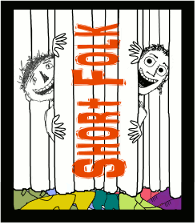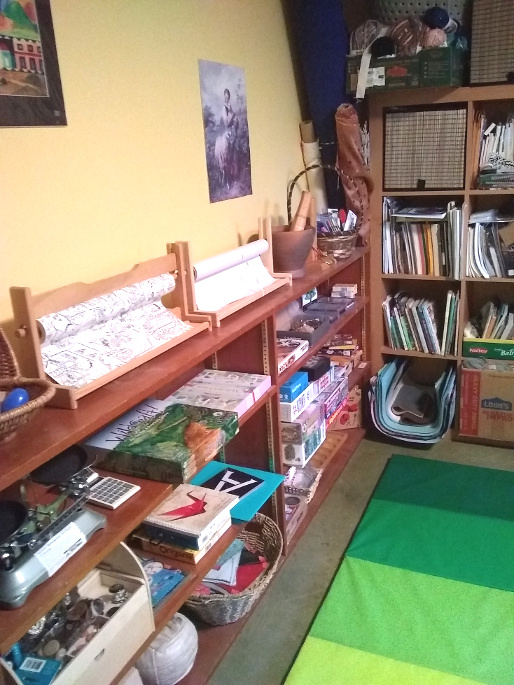

Overall, Short Folk priorities include providing a safe and loving environment for people to learn and grow. We also want to model and teach the highest of moral codes to children (or, for that matter, adults). We believe that children are the hope of the future, but in order for them to be able to reach their full potential, they must have an environment of acceptance, non-violence and love. We believe that the solutions of the world lie within the grasp of each of us as world citizens, and therefore guarding and guiding the next generation of world citizens is one of the most important things we can do to change the world. This is how we follow Gandhi’s advice to be the change we want to see in the world.
At Short Folk, our top teaching priority is to foster life-long learners by creating lovers of books. We don’t emphasize reading mechanics, but rather the infinite possibilities held within books. In our experience, reading and writing come quite naturally to those children who are immersed in the world of books. Children want very much to learn how to be adults, and it doesn’t escape them that reading is an important skill, but when the focus is on performance of a task with which they might feel uncomfortable, they can get the idea that books are a chore, not a delightful gift.
Learning to read is pivotally important to modern life, but in our nation of high literacy, reading is in heavy decline. We trace this critical fall-off to our failure as a nation to teach our children that books are for more than assignments. Besides just being a whole lot of fun, they’re for passing on hard-earned wisdom, wisdom that’s often couched within the format of an engaging story. We all need answers, and many answers are in books. Books hold almost all the wisdom we humans have accumulated on this planet. We believe art is a wonderfully important form of expression and therapy, and a great part of any well-rounded education, but reading is the true foundation for adult communication and growth.
At Short Folk, we read to our children every day if possible, fiction and non-fiction, and we also encourage them to read to themselves in quiet times. The more we all read to kids, the more and the better they themselves will read, and write, and succeed. Reading to our kids takes little to no money; only time, and that time is one of the greatest gifts we can give our world’s children. Those are the memories that grow strong life bonds between parents and children.

Short Folk is a vegetarian environment. We do not allow outside food (with certain approved exceptions), but we do talk about the merits and demerits of various foods and diets. Food is one of the most important aspects of life, so we want to start our children learning about the intricacies of good nutrition. We generally cook with organic-or-better whole foods, and eat in a communal, family style that recognizes the seasonality of natural foods. Food is an on-going learning process for us, and we believe in giving our children the best guidance that we have to give on this topic, as in all others. We try to close the food loop by teaching composting, gardening, permaculture, and edible wild foods.
We also teach the importance of fermented foods, and with the kids we make kraut, kombucha, kefir, yoghurt, butter and soft cheeses so they can see where healthy food comes from. We can support a vegan diet, as well as food allergies and intolerances. We don’t force anyone to eat anything, but we do encourage everyone to at least taste everything, and we teach that palates change over time, so repeated tasting can foster a love, and even a craving, for foods we once detested. We also think it’s important to teach the interdependence of humans and natural systems – permaculture holds key answers to saving the planet, in our humble opinion, so we try to take each opportunity to normalize healthy and sustainable earth relations.
Short Folk utilizes Montessori inspired sensory exercises, and we believe that refining the sense of taste can also lead kids to be more open to new taste sensations. We encourage Short Folk families to expose kids to the many tasty foods available in our world, including untamed edibles.
We support a sugar-free or almost sugar-free diet (kombucha feeds on sugar, so that could be seen as an exception). Kids who have been exposed to sugar will usually go through an adjustment period, when nothing is sweet enough for them. This is a natural come-down from the drugs, but as we continue to expose palates to new flavors and experiences, their tongues become sensitized to the sweets that are offered by nature, including berries, stevia, monk fruit, maple syrup and honey.

At Short Folk, we firmly believe in normalizing body functions. That doesn’t mean that every child needs to be exposed to all information at once, but it does mean that conversations about peeing, pooping, general biology, menstruation, human sexuality, upcoming puberty, gender issues, and the meaning of informed consent are possible. If a child is old enough to ask a question, we believe they’re old enough to get a truthful, age-appropriate answer. We encourage all parents to inform themselves about the excellent literature available for teaching children healthy body awareness (some of which can be borrowed from our little library).
We strongly encourage all parents to become familiar with our body and sex books, so that healthy discussions of important sexual issues like informed consent can be repeatedly stressed and thoroughly understood. We at Short Folk believe that this is the key to strengthening our children against the dangers of sexual abuse, and there is hardly anything more important. Abuse requires an atmosphere of secrecy, and we absolutely refuse to keep sex (one of the most normal of all human behaviors) a secret. We also support non-gender-specific roles and role models.
Similarly, Short Folk is interested in normalizing language. Instead of forbidding “bad words,” a practice that can only be a stop-gap measure, we emphasize the matching of word choice to different social situations. Our society has strict views on young children cussing in public, but we believe the healthiest approach is to teach our kids that all words are just words, and home is the perfect environment for learning how to appropriately use words that some would deem “bad.” While the occasional public slip-up is bound to happen, that’s the nature of life, and Short Folk kids are generally quick to grasp what words are appropriate to each environment they encounter. We think this approach seems to ease a child’s passage to adulthood, rather than fostering resentment over words that are forbidden to them but socially commonplace.

The celebration of “religious” holidays is not a Short Folk priority, though we welcome all forms of celebration. We teach the commonality of human uses of metaphors in general rather than promoting any one metaphor over another. The world is a complicated place, and we accept the long-term futility of oversimplification for our kids, choosing instead to foster acceptance of diversity. We refuse to contribute to the lies and hype of Christmas as it is normally celebrated by American media, but we make a point of celebrating each of the seasons and the markers of time, like new years, solstices, eclipses and birthdays (in perspective - we don’t do traditional birthday parties, but we do recognize the passage of milestones).
Of course, learning to read and the completion of reading milestones are definite occasions for celebration!
That said, we do understand that society does schedule work and school around these holidays, so Short Folk will not normally hold sessions when the rest of the world is on vacation. Exceptions may apply, and Short Folk parents are free to apply for special occasion sessions as needed.